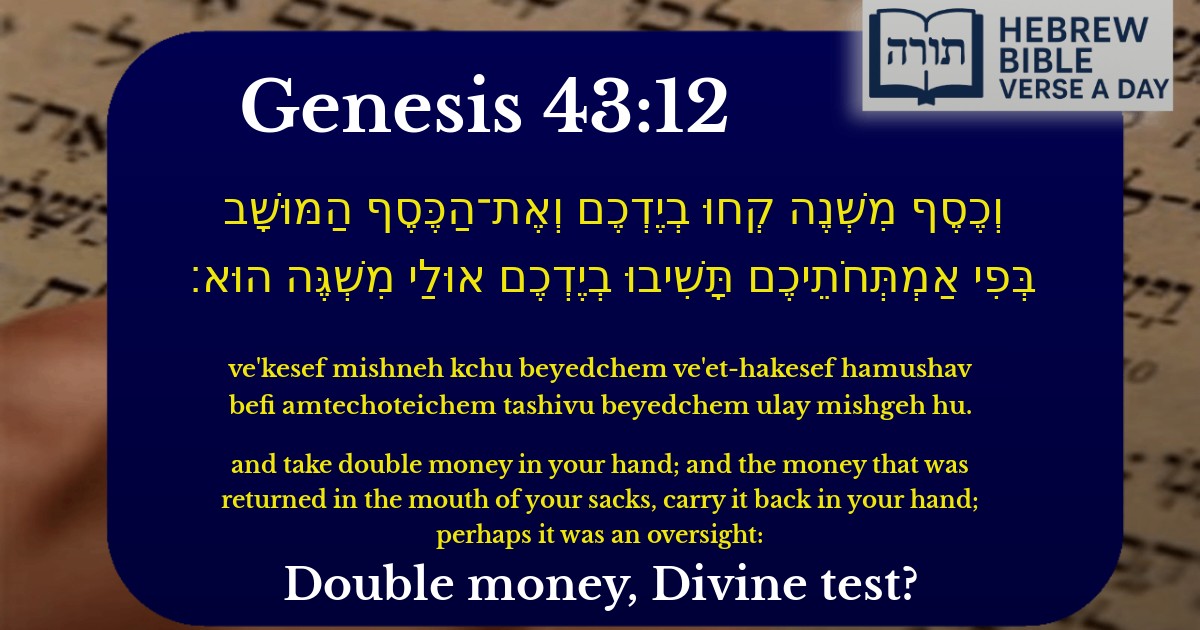Join Our Newsletter To Be Informed When New Videos Are Posted
Join the thousands of fellow Studends who rely on our videos to learn how to read the bible in Hebrew for free!
Hebrew Text
וְכֶסֶף מִשְׁנֶה קְחוּ בְיֶדְכֶם וְאֶת־הַכֶּסֶף הַמּוּשָׁב בְּפִי אַמְתְּחֹתֵיכֶם תָּשִׁיבוּ בְיֶדְכֶם אוּלַי מִשְׁגֶּה הוּא׃
English Translation
and take double money in your hand; and the money that was returned in the mouth of your sacks, carry it back in your hand; perhaps it was an oversight:
Transliteration
Ve'kesef mishneh kchu beyedchem ve'et-hakesef hamushav befi amtechoteichem tashivu beyedchem ulay mishgeh hu.
Hebrew Leining Text
וְכֶ֥סֶף מִשְׁנֶ֖ה קְח֣וּ בְיֶדְכֶ֑ם וְאֶת־הַכֶּ֜סֶף הַמּוּשָׁ֨ב בְּפִ֤י אַמְתְּחֹֽתֵיכֶם֙ תָּשִׁ֣יבוּ בְיֶדְכֶ֔ם אוּלַ֥י מִשְׁגֶּ֖ה הֽוּא׃
וְכֶ֥סֶף מִשְׁנֶ֖ה קְח֣וּ בְיֶדְכֶ֑ם וְאֶת־הַכֶּ֜סֶף הַמּוּשָׁ֨ב בְּפִ֤י אַמְתְּחֹֽתֵיכֶם֙ תָּשִׁ֣יבוּ בְיֶדְכֶ֔ם אוּלַ֥י מִשְׁגֶּ֖ה הֽוּא׃
🎵 Listen to leining
Parasha Commentary
📚 Talmud Citations
This verse is not quoted in the Talmud.


Context of the Verse
This verse (Bereshit 43:12) is part of the narrative where Yaakov instructs his sons to return to Egypt to purchase food during the famine, this time bringing Binyamin with them. Yaakov advises them to take double the money—both the new payment for food and the money that had been mysteriously returned to their sacks during their previous trip.
Rashi's Explanation
Rashi explains that Yaakov instructed his sons to take "double money" (כֶסֶף מִשְׁנֶה) to pay for two portions of food—one for the current purchase and another to account for the food they had already taken but not paid for (due to the returned money). The phrase "perhaps it was an oversight" (אוּלַי מִשְׁגֶּה הוּא) indicates Yaakov's concern that the money might have been returned by mistake, and they must rectify the situation to avoid appearing as thieves.
Rambam's Perspective on Honesty
Rambam (Hilchot Gezeilah Va'Avedah 11:11) emphasizes the importance of returning even potential overpayments or mistakes in financial dealings. Yaakov's instruction aligns with the halachic principle of hasagat gevul (avoiding unethical gains), ensuring that Bnei Yisrael act with integrity even when the other party may have erred.
Midrashic Insights
Halachic Implications
The Gemara (Chullin 91a) derives from this verse that one must go to great lengths to avoid even the suspicion of theft. Yaakov's insistence on returning the money—despite the possibility that Yosef (unbeknownst to them) had orchestrated its return—teaches the importance of marit ayin (avoiding actions that could be misinterpreted). This principle later becomes foundational in halachah regarding financial integrity.